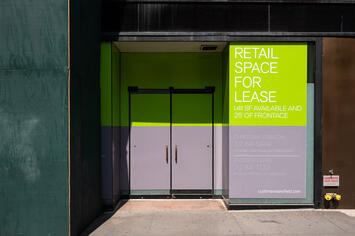
New York City, like many urban areas, has suffered vacant storefronts in recent years. The causes are likely many: online shopping, property crime, difficulty in hiring low-wage staff or paying the going rents.
An article at politicsny.com this week notes that some city councilmembers are on the case and, as often, blaming landlords. Even a rare Republican on the council is threatening them with fines for, she says, “purposely” leaving space unrented.
This is a frequent allegation in Gotham, both for commercial and residential space, based on suspected motivations growing out of the city’s tangled property laws. But what makes the charge ironic at the moment is that other landlords–or maybe the same ones–are accused of willfully leasing to the 2,000 illicit cannabis shops that have sprung up in the city since New York State legalized buying weed and tried, in a shambolic program, to channel sales to a reparations-based roster of approved dispensaries.
Only a few dozen licensed shops have managed to open, but virtually every neighborhood has plenty of the other type. This has particularly incensed Gale Brewer, councilwoman on the Upper West Side (and former borough president of Manhattan). As the New York Times noted in a feature this month on her crusade, she is a “lifelong liberal” and “tireless tinkerer” who “had set out to prove how the power of government” could set things right. In fact, she has an ongoing interest in storefronts, having two years ago set after grocery-delivery outfits that were renting pandemic-emptied spaces as sub-depots and turning once-bustling blocks into dim warehouse strips.
That problem mostly solved itself (the delivery craze subsided) but, in fact, there’s usually something in the naked city’s ever-changing commerce to cause political upset. Mayor LaGuardia rousted slot and pinball machines, and Mayor Giuliani closed porn shops. The thing about unruly spots like New York is that just about any human desire is met and, unless the law makes it impractical to do so, somebody will offer an interior to do the meeting–just wait. It takes a lot of tinkering to try to get the mix just right.
This piece first appeared on Tim W. Ferguson blog.
Tim W. Ferguson, the former editor of Forbes's Asia edition, writes about business, economics and society.
Photo: Joshua F. Madison under CC 3.0 License.












